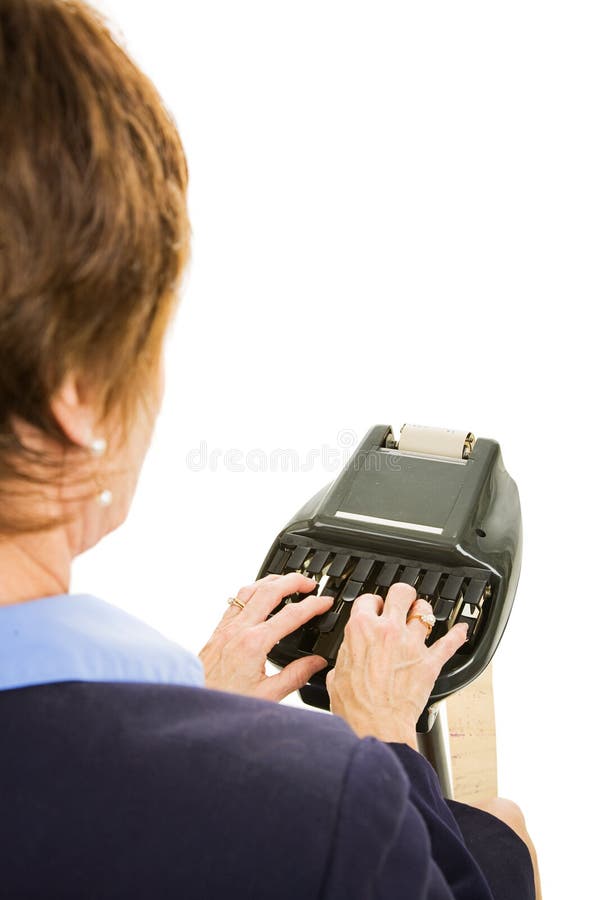How a Court Typist Ensures Accurate Legal Documentation
How a Court Typist Ensures Accurate Legal Documentation
Blog Article
Discover the Crucial Abilities and Duties of a Court Typist in Today's Lawful Landscape
As a court typist, you hold a crucial position in the lawful system. Your skills go past just keying; they involve recognizing complex lawful terms and treatments while making certain accuracy in every record. You work together very closely with judges and lawyers, making your duty crucial for efficient communication. However what details skills do you need, and exactly how can you adjust to the ever-evolving technological landscape? Let's explore this better.
The Role of a Court Typist in the Judicial System
As the backbone of the judicial system, a court typist plays an essential function in assuring that legal procedures are accurately recorded. You are accountable for transcribing everything from witness testimonies to courts' rulings, catching every detail with precision. Your work aids keep a clear and long-term record of court tasks, which is crucial for future referral and appeals.In the court room, you're commonly the unsung hero, quietly assuring that all spoken words come to be composed documents. You preserve confidentiality, recognizing the sensitive nature of lawful issues. You also collaborate closely with legal representatives, staffs, and courts to guarantee the smooth flow of details. By functioning efficiently under stress, you add to the general efficiency of the judicial process. Your attention to detail and dedication to accuracy not just promote the honesty of the court however likewise support the more comprehensive search of justice in culture.
Crucial Abilities Needed for Court Typists
Court typists require an one-of-a-kind blend of skills to succeed in their crucial function within the judicial system. Most importantly, you need to have outstanding typing abilities, commonly accomplishing rates of 70 words per min or even more. Precision is crucial; even a minor error can cause substantial misconceptions in legal documents. You'll also require strong focus to information, guaranteeing every word is recorded correctly.Additionally, great organizational skills are essential for handling several situations and files successfully. Being tech-savvy is crucial, as you'll utilize different software application programs for data processing and file management. Solid interaction abilities assist you connect with judges, lawyers, and various other court workers effectively.Lastly, a feeling of expertise and discretion is a must, as you'll manage delicate info daily. By developing these abilities, you'll be well-prepared to add significantly to the court environment.
Comprehending Legal Terms and Procedures
As a court typist, you need to realize vital legal terms and treatments to execute your job successfully. Recognizing these concepts not only helps you transcribe properly yet additionally assures you can follow the circulation of court process. Allow's explore the vital lawful vocabulary and an overview of court processes you need to know.

Secret Legal Terms
Comprehending vital lawful terms is important for any person operating in a court room setting. You'll often run into terms like "complainant," which describes the person starting a suit, and "accused," that responds to the claims. Understanding the difference in between "civil" and "criminal" cases aids you understand the context of the proceedings. Knowledge with "subpoena" warranties you understand the legal documents compelling witnesses to affirm. Additionally, terms like "proof" and "statement" are necessary, as they associate directly to the info presented in court. Understanding these terms not just enhances your performance as a court typist however also ensures that you contribute to the precision and clearness of lawful records. Your function depends upon exact terminology, so do not take it lightly!
Court Procedures Introduction
Familiarity with vital legal terms establishes the stage for grasping court procedures. Understanding exactly how a courtroom features is important for any court typist. You'll come across procedures like arraignments, where offenders hear fees, and activities, which are ask for a court judgment. Familiarize yourself with the functions of staffs, lawyers, and judges, as each plays a crucial part in process. Knowing the flow of a test-- from jury choice to shutting disagreements-- assists you precisely record the procedures - court typist. Additionally, comprehending the relevance of maintaining a unbiased and precise document can not be overstated. By mastering these aspects, you'll improve your efficiency in recording important court activities and contribute significantly to the legal process. Your function is important in maintaining the honesty of court documents
The Effect of Innovation on Court Entering
Technology's transformed court keying in substantial means. With digital transcription tools, you can increase efficiency and precision, making your work less complicated than ever. And also, remote court proceedings have altered just how you approach your work, requiring flexibility to new formats and modern technologies.
Digital Transcription Devices
As digital transcription devices continue to develop, they're transforming the method court typists perform their duties. These tools streamline the transcription process, permitting you to record spoken words properly and effectively. With voice acknowledgment software application, you can transcribe real-time procedures, lowering manual input and decreasing errors.Moreover, cloud-based systems allow easy access to documents, so you can work collaboratively with lawful teams and ensure everyone's on the exact same web page. Automated formatting attributes save you time on recurring tasks, letting you concentrate on material quality.Additionally, electronic tools enhance safety, safeguarding delicate information with encrypted storage space and controlled gain access to. By welcoming these innovations, you can boost your productivity and preserve the high criteria called for in the lawful field.
Remote Court Procedures
The rise of remote court proceedings has significantly changed the landscape for court typists. You currently depend on modern technology to record and transcribe real-time hearings from your home or workplace. Experience with video clip conferencing systems is vital, as you'll require to browse them perfectly to ensure an exact document. You'll also have to handle audio high quality, as history sound or link issues can disrupt your work. In addition, remote proceedings demand quick thinking; you may need to clear up statements or request repeats in real-time. Staying organized and effective is essential, as deadlines remain tight. Accepting these technological innovations not just enhances your skills but also ensures you continue to be an indispensable possession in today's advancing lawful setting.
Accuracy and Attention to Detail in Transcription
Precision and attention to information are essential in transcription, specifically for court typists. court typist. When you're transcribing lawful process, every word counts. A solitary blunder can change the significance of a declaration, potentially influencing the end result of a situation. You must pay attention thoroughly, ensuring that you record every subtlety and inflection in the audio speaker's voice.Your ability to capture typos and grammatic errors is vital. You do not simply type; you confirm that the last paper is a specific depiction of what was stated in court. This requires an eager eye and a thorough understanding of lawful terminology.Moreover, you'll require to be acquainted with different accents and talking styles, as courtrooms can host a selection of audio speakers. By sharpening your precision and attention to information, you'll preserve the integrity of lawful files and contribute substantially to the judicial procedure. Your persistance in this field really makes a distinction

Time Administration and Organizational Skills
While managing numerous tasks, effective time management and organizational abilities are important for court typists. You'll typically juggle various target dates, from transcribing court proceedings to preparing lawful papers. Prioritizing your workload is vital; determine urgent jobs and tackle them first to assure timely submissions.Organizational abilities come right into play when you're sorting via case notes, transcripts, and documents. Maintaining everything neatly classified not only saves time but likewise lessens the danger of error. Using tools like schedules, to-do checklists, or specialized software application can aid you remain on track and manage your time effectively.Moreover, establishing particular objectives for each job session can improve your productivity. Damage bigger projects right into smaller jobs to make them a lot more manageable. By refining these abilities, you'll not only improve your performance however additionally contribute considerably to the smooth operation of the lawful process, ensuring everything runs like clockwork.
Proceeding Education and Expert Development Opportunities
Investing in your abilities doesn't quit with time administration and organization. As a court typist, you'll locate that proceeding education and expert advancement are essential to remaining competitive in the legal field. Seek workshops or on the internet training courses concentrating on innovative typing strategies, lawful terminology, and transcription software program. These can hone your skills and aid you adapt to the most recent technologies.Networking is similarly essential. Sign up with expert organizations like the National Court Reporters Association (NCRA) or neighborhood lawful associations. They often provide resources, training sessions, and seminars that can improve your expertise and link you with peers.Don' t neglect concerning qualification programs that can boost your reliability and marketability. Staying updated with the most recent this hyperlink trends and best practices in lawful documents will certainly boost your effectiveness and accuracy, making you a very useful property to any kind of lawful team. Purchase your development, and you'll reap the incentives throughout your job.
Regularly Asked Inquiries
What Is the Regular Wage Variety for a Court Typist?
A court typist's common salary ranges from $30,000 to $55,000 each year, relying on experience and place. You might additionally locate chances for growth with added skills, resulting in increased pay in the lawful field.

Are Court Typists Required to Have a Lawful Level?
Court typists do not need a legal degree, however having one can be helpful. You'll usually find that strong typing skills and understanding of legal terminology are more crucial for success in this duty.
What Are the Job Hours for a Court Typist?

How Do Court Typists Ensure Confidentiality in Their Work?
You guarantee privacy by safely managing delicate papers, utilizing encrypted software program, and adhering to rigorous methods. You remain familiar with personal privacy regulations and only share details with licensed personnel, preserving rely on the judicial procedure.
Can Court Typists Job Remotely or Freelance?
Yes, you can work remotely or freelance as a court typist, especially if you have reputable modern technology and a safe and secure setting. Lots of attorneys currently accept remote work, offering adaptability and chances for independent typists. As the backbone of the judicial system, a court typist plays an essential duty in ensuring that lawful procedures are accurately recorded. As a court typist, you need to grasp vital legal terms and procedures to execute your task Go Here effectively. Understanding these terms not only enhances your performance as a court typist however also ensures that you contribute to the precision and clearness of legal documents. The surge of remote court process has greatly transformed the landscape for court typists. As a court typist, you'll discover that proceeding education and professional advancement are important to staying affordable click here now in the legal area.
Report this page